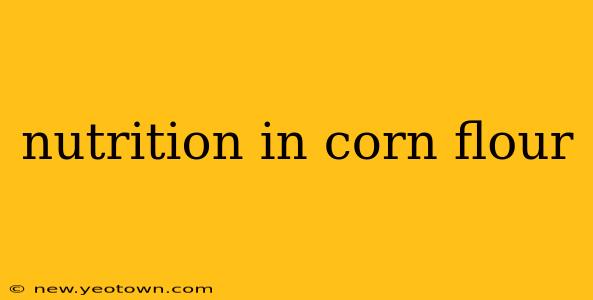Corn flour, often overlooked in the culinary world, is a surprisingly versatile and nutritious ingredient. While its primary use might be thickening sauces or making tortillas, understanding its nutritional profile unlocks a world of possibilities for healthy and delicious meals. Let's embark on a journey to explore the nutritional landscape of corn flour, uncovering its hidden benefits and addressing common concerns.
What is the nutritional value of corn flour?
Corn flour, also known as maize flour, is made from ground dried corn kernels. Its nutritional value varies slightly depending on the type of corn used (white, yellow, etc.) and any processing it undergoes. However, generally, corn flour provides a good source of carbohydrates, offering energy for the body. It also contains some protein, although not as much as other grains like wheat. Furthermore, it's a source of essential minerals like iron and various B vitamins crucial for numerous bodily functions. However, it's important to note that corn flour is relatively low in fiber and fat.
Is corn flour good for weight loss?
This is a complex question. While corn flour itself isn't inherently fattening, its high carbohydrate content means it can contribute to weight gain if consumed excessively, particularly if not balanced with a healthy diet and regular exercise. The lack of significant fiber also means it doesn't promote satiety as effectively as some other grains. Therefore, using corn flour in moderation as part of a balanced diet is key for weight management. Focusing on whole-grain corn products or incorporating it into recipes with high-fiber ingredients can help mitigate its potential impact on weight.
What are the benefits of corn flour?
Beyond its basic nutritional profile, corn flour offers some intriguing benefits:
-
Gluten-Free Option: For individuals with celiac disease or gluten intolerance, corn flour offers a safe and readily available alternative to wheat-based flour. This opens up a wider range of culinary options without compromising health.
-
Versatile Thickener: Its thickening properties make it an ideal ingredient for sauces, stews, and gravies, adding body and texture without overpowering the other flavors.
-
Cost-Effective: Corn flour is generally a more affordable option than many other types of flour, making it an accessible ingredient for budget-conscious cooks.
What are the disadvantages of corn flour?
While corn flour presents several advantages, it's also important to be aware of its potential drawbacks:
-
Low in Fiber: Its relatively low fiber content means it may not contribute significantly to digestive health, unlike whole-grain alternatives.
-
Limited Nutritional Profile Compared to Whole Grains: Corn flour is often stripped of its outer layers during processing, leading to a loss of certain nutrients. Whole-grain cornmeal offers a more complete nutritional package.
-
Potential Allergen: While less common than wheat allergies, corn allergies do exist, so it's essential to be mindful of potential sensitivities.
Is corn flour healthy?
The healthfulness of corn flour is relative. In moderation, as part of a balanced diet, it can be a suitable ingredient, especially for individuals needing gluten-free options. However, it shouldn't be considered a "superfood." Opting for whole-grain cornmeal whenever possible offers a more complete nutritional profile and greater health benefits. A varied and balanced diet encompassing a range of whole grains and nutrient-rich foods is always the best approach to overall well-being.
How much corn flour should I eat per day?
There's no single recommended daily intake of corn flour. The appropriate amount depends on individual dietary needs, overall calorie intake, and other dietary choices. As with any food, moderation is key. Focusing on a diverse diet rich in fruits, vegetables, whole grains, and lean proteins provides a more comprehensive and balanced nutritional approach.
In conclusion, corn flour holds its place as a versatile and accessible ingredient, but its nutritional value is best understood within the context of a broader, balanced diet. Understanding its strengths and limitations allows for informed culinary choices that contribute to overall health and well-being.

